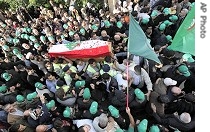2006年VOA标准英语-Lebanese Army Patrols Fault Lines Amid Rising T(在线收听)
By Challiss McDonough
Beirut
06 December 2006
The capital of Lebanon is on edge after the angry funeral of a Shi'ite opposition member who was killed during a clash with Sunni pro-government supporters Sunday night. The army has deployed along Beirut's religious and political fault lines, hoping to keep the two sides apart. VOA Correspondent Challiss McDonough has more from Beirut.
 |
| Funeral procession for Ahmed Ali Mahmoud |
But not everyone was sure that the army would be able to keep things under control. Shops suddenly closed their doors in mid-afternoon, and residents hung around anxiously watching to see if there would be any more trouble.
Neighborhood resident Mohammad Yassin is concerned that the death of a young Shi'ite opposition member will spark a vicious cycle of escalating retribution. "You know, it's like a volcano because every party has its own gangs, its own militias. Every action has its reaction. This is what happened in this area," he said.
It was in this neighborhood that Lebanon's political crisis claimed its first life Sunday since the anti-government protests started last week.
Shi'ite protesters from the southern suburbs were returning home after the evening's speeches. They passed in a loud, rowdy convoy through this Sunni neighborhood, where support for the government is strong. Someone started throwing rocks at them. Car windows were smashed. Security forces moved in to quiet things down. And then the gunfire started, although it is not clear where it came from.
Ahmed Mahmoud, a 21-year-old member of the opposition Amal party, was shot to death. Although it is not clear who killed him, the opposition protesters are accusing the pro-government side of doing it.
Although both the pro- and anti-government sides include different Christian factions, among Lebanese Muslims, the political divisions tend to fall along sectarian lines. Most Sunnis support the government, and most Shi'ites the opposition.
Yassin is worried that the political differences between the two sides are widening into a sectarian rift that will be difficult to heal. "You know, and the most dangerous thing is that we are trying to change the political clash, the political conflict into a religious one. This is the most dangerous thing. We are all Muslims, in this area at least," he said.
Each side, government and opposition, is blaming the other for the political crisis, and for the violence. Each side chants slogans implying that God is on its side. Each side's leaders say they want national unity, but they want it on their terms.
Yassin says the country's political leaders have been pushing their followers to a peak of frustration and anger, and so he thinks those leaders bear the responsibility for whatever violence their followers commit. "Actually it's not in the hands of the people, it's in the hands of the ones who pushed people to the streets. They know that streets are not a controllable area. Whenever you push anyone to the street, you must hold the responsibilities. But this is for shame, leaders are not holding any responsibility, at all," he said.
His observation is not necessarily a common one, in a country where politics often seems driven by a cult of personality, and where the political spectrum is defined less by policy stances than by loyalty to one's leader.
For now, it seems that the leaders of the two sides are refusing to budge, and their supporters are standing with them. A few kilometers from here, thousands of opposition supporters remain camped outside the prime minister's office, demanding his resignation, while inside, the prime minister is vowing not to give in. While that political standoff continues, tensions on the streets of Beirut are growing.